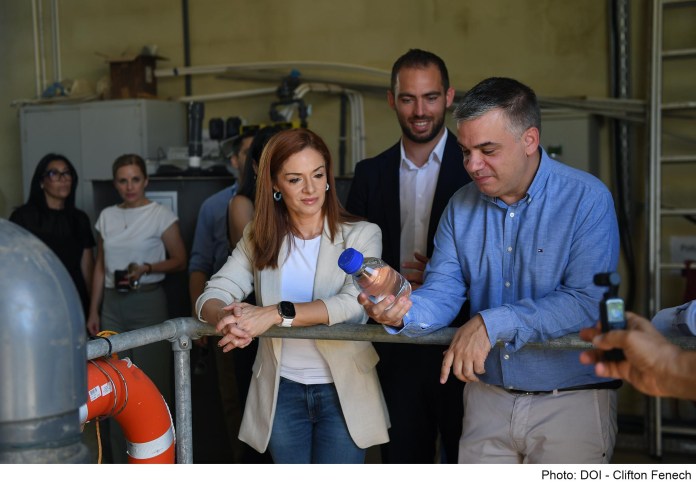
A €24.5 million investment by the Water Services Corporation, co-financed by the European Union, will lead to the extension of the capacity and network of New Water in the South and Southwest regions of the island.
The investment was announced by Minister for the Environment, Energy, and Enterprise, Miriam Dalli, and Parliamentary Secretary for European Funds, Chris Bonett. Accompanied by WSC CEO Karl Cilia, the two visited the Ta’ Barkat Wastewater Treatment Plant.

Minister for the Environment, Energy and Enterprise Miriam Dalli and Parliamentary Secretary for European Funds Chris Bonett announce the Malta South New Water Extension 

Minister for the Environment, Energy and Enterprise Miriam Dalli and Parliamentary Secretary for European Funds Chris Bonett announce the Malta South New Water Extension
The multimillion investment will continue to support the government’s efforts to reduce the pressure from groundwater use. Reusing water is part of the circular economy strategy, where resources are reused, and waste is minimised.
The upgrade is expected to ensure farmers a sustainable and resilient water supply. It is estimated that some 350 farmers, covering an additional 223 hectares of agricultural land, will benefit from this expansion.
“The project is a clear reflection of our relentless commitment towards a sustainable future for Malta and our investment in a greener economy. The New Water initiative has been widely welcomed by farmers, and we want to continue building on its success,” Minister Miriam Dalli said.
Miriam Dalli stated that, “together we are taking bold steps towards a greener and more resilient Malta. This project signifies our commitment to meeting the needs of farmers and safeguarding our agricultural sector for generations to come.”
The investment is based on four pillars: (i) upgrading the capacity at the Barkat Polishing Plant; (ii) applying a Horizontal Directional Drilling (HDD) system to supply water from Barkat and Sant Antnin to the Bidni, San Anard, and Xgħajra Reservoirs; (iii) extending the southwest network to access previously underserved areas such as Żurrieq, Safi, Marsaxlokk, Żejtun, Gaxaxaq, and Gudja; and (iv) the installation of booster stations and pipework.
Parliamentary Secretary Chris Bonett stated, “Once again, together with the help of EU Funds, we are providing the infrastructure needed for the development of agriculture, which is of benefit to a wider range of rural and agricultural stakeholders.”
Parliamentary Secretary Bonett further explained how this project, supported under EAFRD Programme Measure 4.3, is also in line with the objectives of the CAP Strategic Plan. With the provision of new ways of obtaining water for farmers, the government can foster a resilient and diversified agricultural sector while ensuring long-term food security, and strengthening environmental protection, climate action, and the socio-economic fabric of rural areas.
WSC CEO Karl Cilia said, “This comprehensive plan marks a new chapter in our commitment to providing a sustainable and reliable new water supply to our communities. We are moving from talk to action, implementing cutting-edge technologies and infrastructure to ensure efficient management and utilisation of our water resources.”
The investment includes expanding the plant’s production capacity of Highly Polished Tertiary Treated Effluent (HPPTW) by 6,000 cubic meters per day. This upgrade will require the addition of two Ultrafiltration/Reverse Osmosis systems, each producing a peak flow of 125 cubic meters per hour. The New Water will be remineralized and disinfected through an Advanced Oxidation system.
By employing a smart electronic dispenser system, the WSC aims to reduce water losses along the pumping mains.
The network will be implemented through surface trenching, spanning 12km, ensuring a reliable and sustainable water supply for agricultural needs.







































